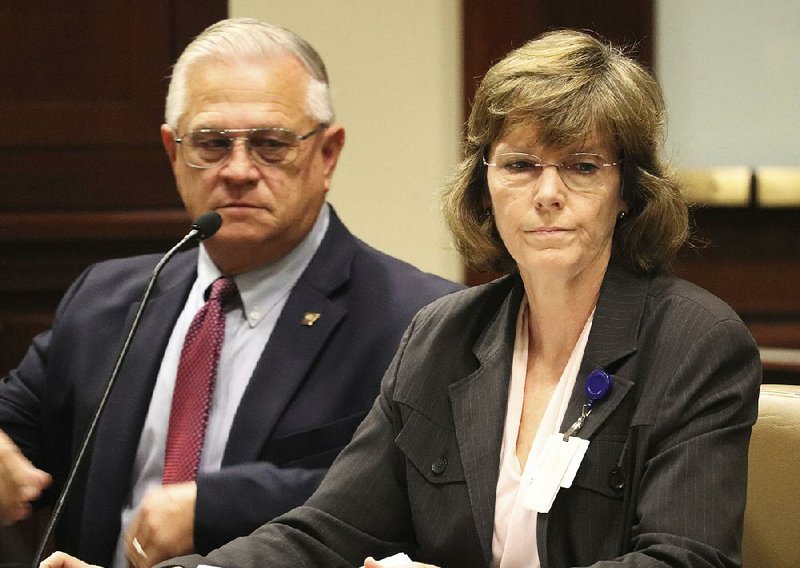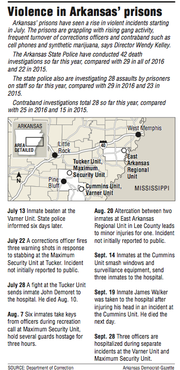Increased pay for guards at Arkansas' most chronically understaffed prisons has helped attract new recruits, while employees are still quitting in bunches.
Meanwhile, inmates are being warned about the volatile effects of synthetic marijuana, but the drug is still flowing into prisons.
And while more lower-level offenders are being diverted to treatment on the outside, the need for spaces to isolate the unruliest inmates is growing on the inside, where gang activity is on the rise, state prisons Director Wendy Kelley told lawmakers Wednesday.
Summoned to talk to lawmakers about a spate of violence this summer within the Department of Correction, Kelley described an agency where resources have been allotted to fix problems as they arise, while systemic issues linger with no easy solution.
The director, now in her third year, gave few new details about what occurred during a half-dozen violent incidents at different prisons from July to September, even though lawmakers on the Charitable, Penal and Correctional Institutions Subcommittee asked why such incidents appeared to be occurring more frequently.
Asked bluntly by the subcommittee chairman, Sen. Joyce Elliott, D-Little Rock, if the prison system was working, Kelley responded that the violence has overshadowed the department's positive achievements.
"It's not going to do what it's supposed to do for every inmate, but it does remarkably well with a lot of them. Unfortunately, that is not the reason I was called here today," Kelley said.
The day before the meeting, the Correction Department released a three-part "action plan" to address security lapses at several units. The plan was highlighted by the proposed conversion of roughly 400 cells into restrictive housing where inmates can be locked down for at least 22 hours a day.
Another possible solution, Kelley told the committee, would be hiring a statewide prosecutor to handle crimes committed behind bars. Local prosecutors often have a full caseload, Kelley said, and they don't prioritize prosecuting prison crimes.
According to the Arkansas State Police, the law enforcement agency that looks into prison crimes, the number of investigations opened into reported assaults or battery of corrections officers and inmates so far in 2017 roughly matches the totals in each of the past two years. To date, 44 such incidents have been investigated, according to state police statistics given to lawmakers.
"It's an anomaly in terms of the extent of injuries that have occurred to the staff," Kelley said, referring specifically to a pair of incidents last month at the Varner and Maximum Security units.
"We have come up with ways to make it safer on the inside, and I'm hoping that that will help with recruitment, that staff will feel safer," Kelley said.
There are about 300 vacancies across Arkansas' prison system, said Dexter Payne, the deputy director of institutions. That's after the department hired 200 new guards this summer, partially as a result, he said, of lawmakers boosting correctional officers' pay on top of a pay raise given to all state employees in July.
However, of those new hires, 50 have already left.
"We do hire a lot of people, they just don't choose to stay," Kelley said. "Corrections seems to be one of those fields where once you get in there you either love it or find out very quickly it's not for you."
Kelley said there has been a "critical shortage" of guards at the Varner Unit, home of Arkansas' only SuperMax prison, since at least January. Officers there have had to pull mandatory overtime and officers are being pulled from other prisons to work shifts, she said. Had there been enough officers to conduct more regular searches, a shank used in one incident may have been uncovered beforehand, Kelley said.
The department sets up booths at job fairs where applicants can get offers on the spot, Kelley said. For months, a large sign along the U.S. 65 turnoff for the Varner and Cummins prison has advertised starting salaries -- now at $29,046 a year.
The "action plan" released Tuesday didn't address staff shortages. While Kelley said pay raises have helped, she said the underlying problem has been finding people who want to drive to far-off towns like Grady and Gould to work in prisons.
The majority of Arkansas' roughly 16,000 prisoners are housed in large units in the Delta, especially in Jefferson and Lincoln counties.
"There's not a lot of people banging down the door to come work for us," she said.
Another issue, Kelley acknowledged, is that some guards have been fired for smuggling drugs and other contraband into prison. The Arkansas Times reported last week that synthetic marijuana, known as K2, has become an increasing problem and is linked to at least one death.
The number of inmate deaths investigated this year -- 42 -- is a marked increase, according to state police statistics. The agency investigated 29 deaths inside prisons last year. Reached by phone Wednesday, Kermit Channell, the director of the state Crime Laboratory, said the lab has seen an increase in cases of drug-related deaths sent to it from the Correction Department.
When asked during the committee meeting if she had a message for friends and family of inmates, Kelley delivered a warning against participating in "games" inmates use to get access to drugs and other contraband. She said the department has handed out fliers warning them about the dangers of K2.
The "action plan" did not address drugs or other contraband. In addition to building more restrictive housing beds to be used as punishment, the plan included improving security at recreation areas and at the entrances to barracks.
Asked if he was satisfied with the department's plans, and Kelley's answers to lawmakers' questions, Rep. Kim Hammer, R-Benton, said he sympathized with trying to maintain a workforce in rural areas of east Arkansas. In a phone call later with a reporter, Hammer suggested conducting a feasibility study to determine the long-term sustainability of having prisons concentrated in one area.
"[Kelley] has an awareness of the problem, whether she has a grasp on the problem will probably be seen in the next three to six months," Hammer said.
Elliott, the committee chairman, said she questioned whether adding hundreds of isolation beds -- to the current 2,191 in the system -- to deal with troublemakers was appropriate, and wanted to do more research. The prison population was 16,220 Tuesday with a capacity of 15,300.
Faced with more calls than she said she's ever received from constituents about prisons, Elliott, a 15-year legislator, said she had hoped to come away with more answers.
"This is not about excusing any activity that people carry on for which they need to be punished," Elliott said. "We also do have to remember, they're under our care, under our supervision and family members have a right to ask these questions."
Metro on 10/12/2017

